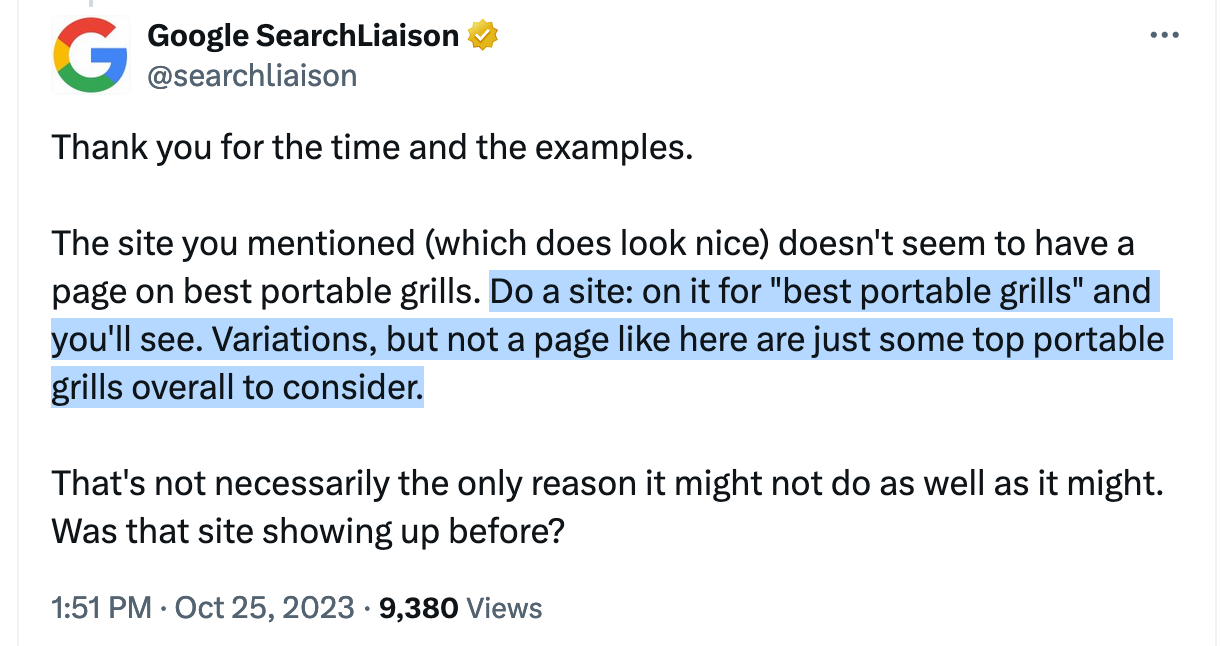SEO is More Than Vague Buzzwords
Google's SEO advice has been extremely vague lately but SEO fundamentals remain the same.
As the current Core+Helpful Content Update is still rolling out (and taking much longer than promised), there have been lots of publishers speaking up about their organic traffic completely gone.
Do you know what many of these publishers/bloggers have in common?
They all write very personal, helpful content that is based on their personal experience
They have gained organic traffic pretty quickly, over the course of a year, and started depending on it at some point.
Google’s advice to those penalized sites?
Forget about Google and prioritize your readers.
Check out our video replay of discussing this topic here!
Relying on a single source of traffic is never a good strategy, only search traffic comes and dominates everything else easily. It is very hard not to start relying on it.
But let’s talk about Google’s advice in more detail.
Google tells us to forget about search and start prioritizing users
Now, what exactly does it mean?
A good SEO strategy has never really meant not prioritizing users. It has always been possible to target both (the search algorithm AND people).
What does a people-first strategy even mean?
Does it mean de-optimizing? Ignoring keywords? Ignoring competitors?
Absolutely not.
Keywords are still fundamental
Keyword research is much more than keyword-matching.
Knowing your keywords helps you understand how your target customers research your relevant topic (their needs and struggles).
Keyword research lets you estimate demand: Keywords with a higher search volume signal higher demand for a particular topic or product…
It allows you to structure your site (for example, keywords with higher search demand would be your main categories; as you extend those keywords with more modifiers, those will be your subcategories)
Keywords help you find content ideas that could diversity the site’s rankings and bring in more people
Knowing your keywords helps you identify what your business or website is missing, e.g. which products or product categories should be added to your online store.
If you don’t believe me, let me remind you of a notorious Twitter conversation when Google was asked why a great site fails to rank for a keyword, and Google’s response was that that site didn’t have a page matching that keyword.
This conversation happened right after the September Helpful Content update which was ALL about not targeting search engines.
Google also says all you need is a powerful brand.
Well, yes, branding is crucial, but without strategic SEO even brands don’t rank
Another conversation that got my attention was a few examples of big brands that fail to rank for what they do… because they ignore SEO
Rolex doesn't rank for "luxury watch"
Chapstick doesn't rank for "lip balm"
Tesla doesn't rank for "electric cars"
Louis Vuitton doesn't rank for "luxury fashion"
Gerber is BARELY on the first page for "baby food"
Most comments on that thread totally missed the point, of course. It doesn’t matter if those brands even need organic search traffic. The point is that even the biggest brands won’t rank unless they match keywords, create landing pages, etc. etc.
Backlinks are less important… Or are they?
Another Googler came out this week (again) saying that backlinks are much less important than they were a decade ago.
There are a thousand ways to make it sound better. Like “Google is much more selective with backlinks” or “Backlinks do not represent a single signal, they contribute to many” or even simply “Backlinks are no longer a single signal.”
But he chose those words….
The best comment I’ve seen regarding this statement is this:
A simple review of just about any competitive SERP will show that there is no single page ranking without backlinks.
A good linkable asset campaign will show that any site will start slowly and surely climb in rankings once the site starts getting good links consistently.
Google telling us to forget about organic search is terrible advice
Google still needs keywords (and yes, this is still how it understands relevancy)
Google still needs backlinks (and yes, this is how it understands authority)
Google still needs internal links and an effective site architecture to determine any site’s key focuses
Google still needs lots of other clues, like Schema, to effectively extract key information from pages and sites.
Making your site accessible and crawlable for Google is not enough to be found (although it is fundamental).
Making your content helpful to people is not enough to be found (although it is fundamental).
You need all those extra signals, like relevance (keywords) and authority (links) to rank.
Google still needs a lot of help, and SEO is how we help Google.
Is it going to change as product and information discovery will start happening through generative AI?
Fundamentally, no.
Generative AI needs humans to give them information. So it will be our job to do that better than your competitors. Just like search engines, AI platforms:
Crawl and save information
Reference sources that they think better answer people’s questions
Use trust and authority signals (e.g. they surface brands that more people talk about and link to)
Use schema to better understand sites and entities, etc. etc.
So whenever you hear that you don’t need SEO and all you need to do is prioritize your users, keep in mind those are just buzzwords. In reality, you need both!





